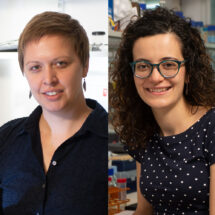 The LMB is delighted to announce the appointment of two new group leaders to the LMB’s Cell Biology Division: Kate McDole and Marta Shahbazi. Kate and Marta, who will take up their roles in early 2020, will join more than 50 group leaders at the LMB, who represent the diverse set of scientists recruited from around the world.
The LMB is delighted to announce the appointment of two new group leaders to the LMB’s Cell Biology Division: Kate McDole and Marta Shahbazi. Kate and Marta, who will take up their roles in early 2020, will join more than 50 group leaders at the LMB, who represent the diverse set of scientists recruited from around the world.
Kate McDole
At the LMB, Kate will focus on defining the sequence of events and physical forces required for one of the earliest symmetry-breaking events in mammalian organogenesis, the formation of the foregut. Conventional microscopy systems have so far been unable to resolve or follow development of the foregut – an essential organ system also linked to the proper development of the heart tube and elevation of the headfolds. Using a combination of cutting-edge live-imaging, biochemical techniques, computational methods, genetics and biophysics, Kate’s group will study how forces shape such complex three-dimensional structures out of simple cell populations.
Kate added that interrogating these forces and understanding how the embryo builds such complex structures will lead us to the “ability to one day repair damaged organs, treat developmental defects in utero, and even grow whole, functional organs outside of the body”.
Kate comes to the LMB from HHMI Janelia Research Campus, Virginia, US, where as a postdoctoral scientist she developed techniques to visualise early mouse development using advanced light-sheet microscopy in Philipp Keller’s group. Kate completed her PhD in Cell, Molecular, Developmental Biology and Biophysics at Johns Hopkins University, Baltimore, US.
The LMB looks forwards to the next phase of Kate’s research to advance the field of mammalian development by using new approaches to address long standing questions.
Marta Shahbazi
Marta’s overarching aim is to understand the molecular mechanisms that govern cell identity – the development of specialised cells during embryogenesis, and plasticity – the ability of adult tissue-specific stem cells to switch to new identities, both in the physiological three-dimensional context of the tissue. Marta will combine studies in embryonic and adult tissues to identify common principles and key differences, with the aim of determining how epithelial features regulate stem cell identity, differentiation and plasticity. This basic knowledge is required to design future strategies aimed at inducing plasticity at the organism-level to achieve tissue formation, regeneration and repair.
Marta added that she is looking forward to LMB’s fertile and creative environment, as well as its state-of-the-art facilities, which will be instrumental to her research. “I also anticipate potential interactions with scientists working on stem cell biology, proteomics, polarity and membrane traffic,” she added.
As a postdoctoral fellow in Magdalena Zernicka-Goetz’s group at the University of Cambridge, Marta established a method that allowed human embryos to grow in vitro beyond implantation and up to gastrulation. Later on, she developed a novel method to maintain self-renewal in 3D epithelial cultures of pluripotent stem cells. Marta completed her PhD at the Spanish National Cancer Research Centre CNIO. She was awarded a Leverhulme Trust Early Career Fellowship in 2017, and an EMBO Advanced Fellowship in 2018.
The LMB looks forward to Marta’s pursuit to understand how tissue architecture regulates stem cell identity at the molecular level – a fundamental question that involves multiple levels of biological organization.